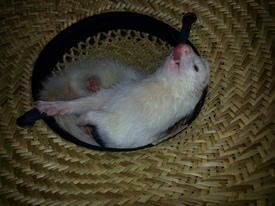so, zero carb folks...
Replies
-
Should I decide to go ZC, any suggestions for keeping my husband from having a heart attack? He even makes me take veggies out camping because he doesn't think it's healthy to just eat meat, coconut oil, & coffee.0
-
Interesting stuff...l thanks to all0
-
The lack of ammonia is intriguing. All of your glucose needs have to be met by gluconeogenesis. Where's all the waste ammonia going? Your body must up regulate some processes to deal with it. Freaky.

OK, I know you don't want to hear it, but my biggest long-term concern would be cancer. Even Bear got cancer. Your IGF-1 must be high, not to mention the potential toxins in animal fat. And lack of antioxidants in your diet. But your risks probably aren't much different than the general population.
He got cancer, because his tonsils were housing HPV, which is known to cause cancer (cancer prevention is one of the big selling points of Gardasil, an HPV vaccine for women). The second-hand smoke he originally attributed it to probably didn't help matters. He also attributed his zero carb diet for the fact that its growth had been slowed and it was still treatable, despite the advanced stage it was at.
Tim Ferriss and Dr. Peter Attia actually go into detail on the metabolism of cancer, which has been shown to be largely glucose mediated -- http://fourhourworkweek.com/2014/01/28/cancer-treatment/ From what little I've looked into it, it seems that IGF-1 itself isn't enough to promote cancer (it promotes it, because it's a growth hormone...that's about it), but rather increased IGF-1, insulin, and maybe other growth hormones combined with a high presence of glucose (which makes sense when you also consider that people with insulin resistance have an increased risk of cancer pretty much across the board, because what comes with insulin resistance? More blood glucose). IGF-1 may be a mediator, but cancer chooses glucose over fatty acids. I don't think anyone's claimed that zero carb equates to being immune to cancer (unlike some other ways of eating...), but there's not really any evidence that it causes or increases risk of cancer.
Also, animal sources actually have a pretty high level of antioxidants and anti-cancer agents. Butyric Acid, for example, is anti-cancer. It's found in grass fed butter. It also has anti-inflammatory properties. Grass fed butter and pastured eggs are also high in vitamin E, a known antioxidant, as are certain fish (namely Cod and Tuna). You can minimize toxins by eating lower on the food chain when applicable, and by eating wild or pastured animals.
As for gluconeogensis, don't forget that the body also down-regulates the amount of glucose it needs to begin with. When you're fat adapted, you no longer need 120g just for your brain, but more like 40g. You also can go to higher intensities of workouts before switching to burning sugar, the body becomes more efficient at running on ketones and free fatty acids.0 -
-
I meant lack compared to some veggies. There was some evidence from an archaeological dig that our ancestors enjoyed reindeer meat. More omega-3's than salmon.
 0
0 -
Bear had many factors that could have contributed to his cancer, probably the biggest being the HPV already mentioned. There was also smoke exposure from his years working the the Dead. I also wonder if chemical exposure played some role. The manufacturing of LSD involves several "not nice" chemical reactions and byproducts. He was manufacturing large amounts in a home-brewed lab. I think we'll never know what actually caused the cancer. Bear did claim that his doctor was shocked at how little it had spread and grown, which Bear attributed to lack of glucose. I am pretty convinced that this way of eating has anti-cancer benefits. Not saying it makes me immune. But, populations eating this way had very, very low cancer rates and research about glucose and cancer suggests there's a link.
As for antioxidants, some important facts have already been discussed. The other major thing to remember is that when you remove carbs, refined grains, vegetable oils, and plants... you have also removed most of the sources of free radicals and other damaging agents that you need the antioxidants to mitigate. If I no longer have a car, I don't need to worry about regularly changing the oil and other maintenance issues.0 -
The IGF-1 theory is that everybody gets cancer cells eventually, but reduced levels of IGF-1 can keep them from growing. The glucose metabolism of cancer seems somewhat controversial -- the cells may be more adaptable than we think, but keto is becoming an accepted adjunct therapy. Like I said, you're probably at no greater risk than us SAD folk.
There's also gastrointestinal cancer associated with a group in Poland that was on a long-term mostly-meat diet (the "Optimal Diet"). It might have been the kind of meat they were eating.0 -
Works fine for me.
Lately my meals have been
Breakfast: 1/2 pound 75/25% ground beef plus 2-slices of bacon (plus some grease)
Lunch: 1/2 pound 75/25% ground beef plus 2-slices of bacon (plus some grease)
Dinner: 12oz - 1.5 pounds of chuck steak/beef.
My bill isn't bad, in my eyes. A day like that runs me $7.75 a day or about $55 a week. I could get it lower. Eating more bacon and/or eggs would make it cheaper for me. But, this is well within my budget.
I feel great.
Yes, there is a transition period. Even going from keto to zero. But, it's mild and short.
Sorry I am not more detailed right now. Just on my way to bed. I'll probably elaborate more tomorrow.
Do you have a rough idea of how many grams of protein that equates to? Total newbie here. I haven't even started yet. Prolly another week! But in the Art and Science of Low Carbohydrate Living the author basically said to make sure you don't go overboard on protein. For me, prolly 150g/day. Over that and I would start producing glucose? If you need more calories, make it fat? Does that sound right? I know that the zero carb is a minority, but to me it's appealing in it's simplicity. So simple. Maybe not always easy, but certainly simple. Thank you for your time!
0 -
Hmm, some study into the IGF-1 information makes me think that I'd rather take my chances with it being too high than with it being too low. In the end, it doesn't matter. If you look at all the various cancer risk factors and how they changed when I changed to eating this way, the vast majority of the risk factors went down. If this one risk factor went up, it's not enough to offset the improvements in all the other areas.0
-
So when is the ZC challenge? May Meat Month?
FWIW, it's actually recommended as a good way to try out keto:
http://www.empiri.ca/p/eat-meat-not-too-little-mostly-fat.html0 -
LOL, I wouldn't encourage anyone to try it in the same way as not counting. While I believe it is awesome and fantastic, it is also impractical and beyond what most people need/want from low carb. If someone wants to try it, awesome. But, If they're happy with their current carb level, then I don't think they should change.0
-
I would try it just fot the heck of it. Just to see. I think I might go a little squirrely though. I don't think there would be enough variety to keep me happy. I like my coconut oil and my coconut in my fat bombs. But I would still (and my yet) give it a go at some point.0
-
After going thru a serious cancer myself, all the education and research taught me that we ALL have cancer, and our bodies combat it daily. Are you aware you dump ~1 million cancer cells a day? everyday of the year, for life. they leave as waste…our bodies are constantly sacrificing cells and washing them out to protect organs. When there is a need to autopsy very elderly dead they are found to have, usually, 3 cancers that were encapsulated sometime in the past, meaning the body silently took care of it without you knowing.
People see cancer as something from the outside that comes in and attacks you, but it is the opposite. it is your own body forming a tumor around the sacrificed cells and protecting you.
We learn that sugars and the toxic foods overwhelm the body's ability to fight by itself, the modern diet and cancer go hand in hand.
There is a lot to learn as cancer is as different as each person, and there is NO one 'cure'..it is what we do with "food as medicine' that helps most, and the AMA push for chemo, when it is known to only help 3% of cancer types ( Like Lance Armstrong testicular cancer, so he is their poster boy) and people trust it will be the same for them…no, in most cases.) And MDs themselves would not accept chemo, yet it is offered as a "do something/anything" approach.
Because these chemo and radiation treatments KILL all healthy cells in the body, everywhere, that are needed daily to replace old cells it is a double whammy to the body....it is testament to your body's ability to take that kind of 'hit' and still recover to be healthy again. Despite 100 years of research, 50 years of strong medicines we have no real drop in any cancers. The ACS is a money making machine, and researchers seeking 'different' approaches are not given grants, and not encouraged..only the whacky "alternative medicine" people keep talking about using food to heal.
My surgeon and resident doc LAUGHED at me for arguing for better diet, and in my records are my "inability to accept standard of care" crazy patient notes. They are clueless on nutrition, and as we see with the USDA dietitians still pushing carbs for everyone. "Complementary medicine" is very slowly being tolerated by big medicine..you are on your own to find answers.
I'm not talking children who develop unusual cancers, or some cancers that must be treated in conventional ways to stay alive, (but what caused them?) I am speaking of how your relationship with your body can help you prevent any cancer cells from needing to clump and stay as a tumor, and how rushing to yank out 'parts' is not the answer. OVER-use of modern medicine, rather than letting the body work it out.
a healthy diet that helps you stay strong is the best thing you can ever do.0 -
I've been trying ZC for April. So far, I've loved it. I'm completely new. I did write about my experiences thus far in the April Challenge check-in thread.
0 -
I would try it just fot the heck of it. Just to see. I think I might go a little squirrely though. I don't think there would be enough variety to keep me happy. I like my coconut oil and my coconut in my fat bombs. But I would still (and my yet) give it a go at some point.
The "but variety!" thing always cracks me up. If you take a good look at what you're eating, there probably isn't that much variety already, just the same things prepared differently.0 -
"Variety".
I've been eating:
Oysters
Prawns
Fish
Beef - mince, steak, roast
Pork - chops, roast (with delicious, delicious crackling)
Eggs
Bacon
Chicken - Pan fried, oven roasted with crispy skin
Butter
Animal Fat
Cream - In coffee and sauces (garlic cream sauce... yummmmmmm)
Sour Cream
You can make sauces and mayo to go with your food or just pour melted better over it. Plenty of variety. This is not repetitive or boring. It's delicious.
0 -
Okay, where do I get reindeer meat??0
-
octobubbles wrote: »Okay, where do I get reindeer meat??
Step 1: Have your spouse distract Santa.
...
...
...0 -
octobubbles wrote: »Okay, where do I get reindeer meat??
Step 1: Have your spouse distract Santa.
...
...
...
HEHE can tell you arent a gamer or a South Park fan.
ok
Step 1: Have your spouse distract Santa.
Step 2: Set out some reindeer games
Step 3: ????
Step 4: Profit!
Rinse and repeat until freezer is full.0 -
octobubbles wrote: »Okay, where do I get reindeer meat??
Reindeer = caribou. You might be able to import it from Canada.0 -
You'd probably have to be a hunter or know someone who hunts in order to get some. I live in Manitoba Canada, and I can buy farmed elk and bison in the health food stores or specialty meat shops. I love deer and especially moose meat. I like a combo of moose / beef in my burgers. ( I've run out of moose right now...) I've had bear meat and I'm looking to get me some more. I have a couple of friends who hunt.0
-
i grew up in a hunting family. i miss venison. and hunting with my dad.
(i vividly remember my mom slicing boiled deer hesrt for sandwiches and raising an eyebrow - but they were delicious!)
hmn... maybe i come by this carnivorous thing naturally, after all.
i have decided to give it a go for 30 days and see what happens. i am already aiming so low for carbs, it isn't that much of a stretch. and i honestly don't feel like i can stomach one more bitr of kale! (:0 -
bite*0
-
tmdalton849 wrote: »i grew up in a hunting family. i miss venison. and hunting with my dad.
(i vividly remember my mom slicing boiled deer hesrt for sandwiches and raising an eyebrow - but they were delicious!)
hmn... maybe i come by this carnivorous thing naturally, after all.
i have decided to give it a go for 30 days and see what happens. i am already aiming so low for carbs, it isn't that much of a stretch. and i honestly don't feel like i can stomach one more bitr of kale! (:
:drinker: Yay, another venison lover! I always request at least one venison meal when I go to my parents' house.
OMG, now I want venison burgers cooked over our new charcoal grill...0 -
What benefits does 0 carb over? I also wonder why not eat any veggies?
The benefits are different for everyone. Most people quickly lose any desire for sweets. Your hunger signals are more in check. Weight tends to normalize. Some have reported reduction in allergies. I seem to be experiencing that, but I can't be sure that it's not just because there aren't low allergens right now. You stop tracking anything. I don't count carbs. I don't count anything. There's no macros to worry about, no fiber to subtract, no ketones to consider. You eat meat until you're full. Meal planning is simple and cooking is quick. I'm having a meat. There's nothing with it. There's really no fancy preparation to do to it either. It sounds boring, and in a way it isn't exciting, but it's also strangely comfortable and easy to accept. A lion doesn't get bored with zebra meat. You don't crave variety because your body isn't missing anything it needs. A lot of craving comes from the fact that you're lacking some nutrient and your body wants more, and/or different, food until that need it met.
Why not eat any vegetables? This is a good question. Personally, it is because my opinion of vegetables has shifted radically from the standard. While most people see vegetables as falling on a range from "healthy to not so healthy" (say for example spinach would be healthy and corn would be not so healthy but still better than nothing), I see vegetables ranging from, at best, "neutral" down to, "harmful." While most people would class a baked potato as "fairly" healthy, I consider it down with the harmful. Actually, my list of "neutral" vegetables seems to grow smaller and smaller the more I investigate them. It used to include spinach and the cruciferous veggies (the keto approved ones), but based on their metabolic and digestive effects, I currently think they're less harmful than many vegetables (like corn) but probably aren't harmless.
Vegetables are not required for health. We can get all the nutrients we need for health from meat, even if we don't resort to eating organ meats. While it appears that some nutrients are less plentiful in meat, what amount is there is highly absorbable and easily utilized by the body. Those vegetables which have seemingly high sources of nutrients, often include substances which hinder absorption and what is absorbed often requires inefficient conversion to make it useful. Take iron, for example. Trying to get all your iron from spinach alone would be asking for trouble unless you carefully adhered to some best practices. You would want to eat a source of vitamin C with that spinach, because that's going to make the iron more absorbable. Without the vitamin C (or eating meat with the spinach), you'll get almost no usable iron absorbed. What little does make it into your blood will be nonheme iron, which is only 10% as useful as heme iron (from meat). The same holds true for most other nutrients.
While meat does appear to be low on some of the RDAs, those are based on a mixed diet and the assumption that you're getting some of that amount from plants. A meat diet also reduces the need for some nutrients. B1 requirements, for example, are lower because a large quantity of B1 is used for carbohydrate metabolism.
What about the two biggies, vitamin C and fiber, both of which are nonexistent in animal sources? We are convinced that both of these are essential for health. If you don't consume enough vitamin C, you'll quickly develop scurvy. But, that's only partly true. If you don't consume enough vitamin C, while eating carbohydrates and unfresh foods, you will quickly develop scurvy. Scurvy can be prevented, and even cured, with nothing but fresh meat. While fresh meat doesn't have vitamin C in it, it has an antiscorbutic (as in it prevents/cures scurvy) effect. Wikipedia suggest that fresh meat does contain trace amounts of vitamin C, I've found little support for that. In any case, whether it does or does not, the effect is the same. Eating fresh meat, not heavily cooked, is enough to avoid scurvy.
Fiber is classed as an antinutrient. Not only does it provide no nutrition for us, it can hinder the absorption of other nutrients. It also can irritate the bowel, cause or worsen constipation, and often has other unpleasant side effects (it's not a coincidence that I no longer fart). It is not required for regularity, it can even cause problems with it. There's been studies that show removing all sources of fiber can help improve/cure some forms of constipation. I have had, essentially, no fiber for 3/4s of a year, and I am as regular as I have ever been.
Alright, I think I've rambled enough for the time being. You're welcome to reject any or all of this as crazy ramblings of a lunatic. "Broccoli is bad for you?! What a madman!"
 thank you for taken the time to explain all of this.
thank you for taken the time to explain all of this.
I'm new to all of this so any information helps me gain a perspective to begin research.
I looked into it a little more last night and saw some articles that it is not a long term plan but can be used in the short term. Is that your experience as well or do you feel this can be a long term method.
(please don't take any of my questions as judgement)
I second this-I'm brand new to this whole thing and it's fascinating! Thanks so much for sharing your own experience-it gives me a place to start as I start diving into this woe more 0
0 -
I have eaten a fair share of wild game in my life as well (also in Canada) but I have to say the BEST meat I've ever eaten is seal. Very hard to get unless you live out there and know someone but ooh la la! It has almost no fat (the fat is a separate layer on them) and cuts like butter.0
-
i would love to try seal! i don't believe i have tried tasting any sea mammals at all! (well, unless you count the dolphin in my tuna fish sandwiches in the 80s. sorry!)0
-
We have a restaurant here that serves wild game, actually more than one, but the one I'm thinking of is more trendy mainstream. People are really starting to expand to different sources of meat.
Something that made a connection for me the other day was reading an article about ancient cultures that are meat/fat, one if them being the native buffalo eating cultures. I live in the suburbs of buffalo ny, named for the high population of buffalo in the area. It makes me think that different parts of the world are populated by different species of animal and plant. Could it be that because we live in those areas we need the indigenous sources fur optimal health, which could be different for everyone given their geographic location.
The prevalence off auto immune disorders, weight issues, diabetes are extremely high in my area, much attributed to the winter weather causing a more sedentary lifestyle.
Could it explain why studies of some groups show one WOE is beneficial for some but unhealthy for others?
*sorry if my posts kinda ramble, I get thinking and my mind just goes0 -
I believe that to be true. We see our aboriginal cultures where I live, to be facing devastating health consequences such as obesity and diabetes, as a result of adopting a sugary, high carb, highly processed SAD diet. I'm sure that their modern diet is much different than the diet they would have eaten centuries or even decades ago, when they would have eaten off the land......wild meat including fat, fish, berries, etc.... I suspect that if they returned to that way of eating, their health would improve.0
This discussion has been closed.















